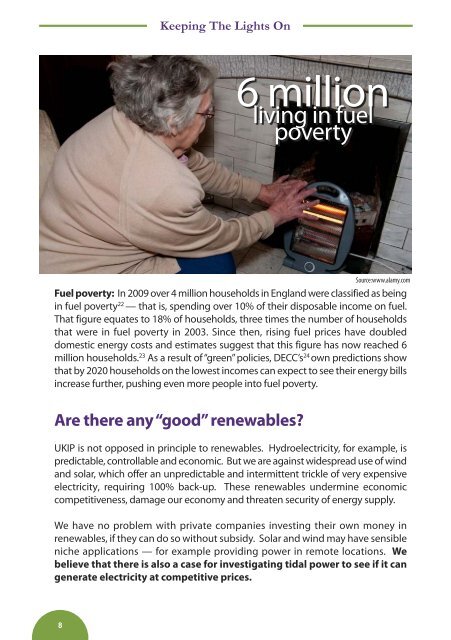keeping-the-lights-on
keeping-the-lights-on
keeping-the-lights-on
Create successful ePaper yourself
Turn your PDF publications into a flip-book with our unique Google optimized e-Paper software.
8<br />
Keeping The Lights On<br />
Fuel poverty: In 2009 over 4 milli<strong>on</strong> households in England were classified as being<br />
in fuel poverty 22 — that is, spending over 10% of <str<strong>on</strong>g>the</str<strong>on</strong>g>ir disposable income <strong>on</strong> fuel.<br />
That figure equates to 18% of households, three times <str<strong>on</strong>g>the</str<strong>on</strong>g> number of households<br />
that were in fuel poverty in 2003. Since <str<strong>on</strong>g>the</str<strong>on</strong>g>n, rising fuel prices have doubled<br />
domestic energy costs and estimates suggest that this figure has now reached 6<br />
milli<strong>on</strong> households. 23 As a result of “green” policies, DECC’s 24 own predicti<strong>on</strong>s show<br />
that by 2020 households <strong>on</strong> <str<strong>on</strong>g>the</str<strong>on</strong>g> lowest incomes can expect to see <str<strong>on</strong>g>the</str<strong>on</strong>g>ir energy bills<br />
increase fur<str<strong>on</strong>g>the</str<strong>on</strong>g>r, pushing even more people into fuel poverty.<br />
Are <str<strong>on</strong>g>the</str<strong>on</strong>g>re any “good” renewables?<br />
6 milli<strong>on</strong><br />
living in fuel<br />
poverty<br />
Source:www.alamy.com<br />
UKIP is not opposed in principle to renewables. Hydroelectricity, for example, is<br />
predictable, c<strong>on</strong>trollable and ec<strong>on</strong>omic. But we are against widespread use of wind<br />
and solar, which offer an unpredictable and intermittent trickle of very expensive<br />
electricity, requiring 100% back-up. These renewables undermine ec<strong>on</strong>omic<br />
competitiveness, damage our ec<strong>on</strong>omy and threaten security of energy supply.<br />
We have no problem with private companies investing <str<strong>on</strong>g>the</str<strong>on</strong>g>ir own m<strong>on</strong>ey in<br />
renewables, if <str<strong>on</strong>g>the</str<strong>on</strong>g>y can do so without subsidy. Solar and wind may have sensible<br />
niche applicati<strong>on</strong>s — for example providing power in remote locati<strong>on</strong>s. We<br />
believe that <str<strong>on</strong>g>the</str<strong>on</strong>g>re is also a case for investigating tidal power to see if it can<br />
generate electricity at competitive prices.


